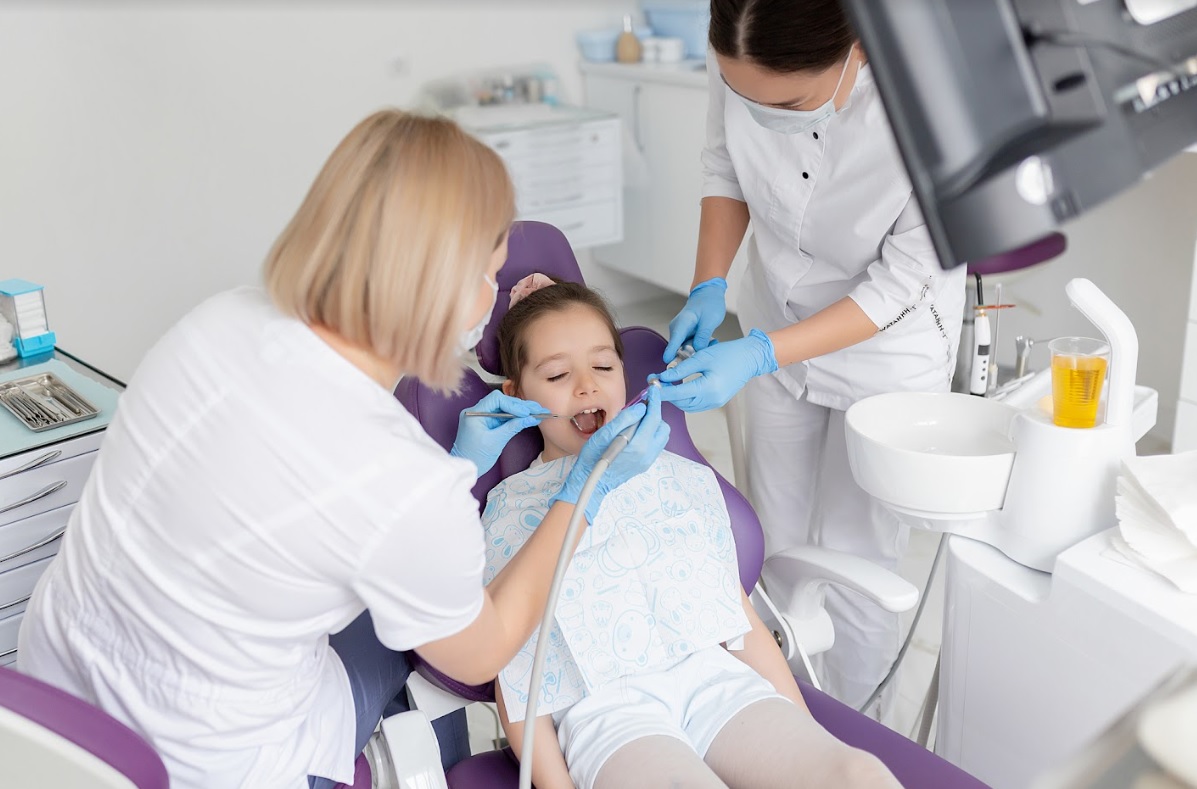Tooth decay is a common problem in children, especially those who don’t practice good oral hygiene. It can lead to painful infections. If left untreated, it can even cause tooth loss. That’s why it’s so important for parents to make sure their kids stay on top of their oral health.
But who are we kidding? Kids usually put up a fight when it comes to brushing their pearly whites!
So how can you get your children to brush, floss, and practice good oral care?
We have a few tips and tricks that’ll work like magic.
So, get ready to say goodbye to the dreaded daily battle and hello to happy, healthy smiles!
1. Make Visits to the Dentist Fun
Ah, the dentist – the place where anxiety and dread tend to make an unwelcome appearance. But it’s so important to visit your dentist regularly.
So, try and make your dentist trips fun. From playing pretend dentist at home to bringing along a favorite toy or stuffed animal, there are plenty of ways to make the experience enjoyable for your little ones.
Also, remember the power of positive reinforcement. After the appointment, a little treat or prize can persuade your child to keep up with regular check-ups.
Pediatric dentists will have tips for you to soothe your teething child. They’ll recommend special toothpaste, brushes, and gels.
Plus, they may even be able to coach your child on proper brushing techniques. If your child has issues with their biting and chewing habits, general dentistry for children by the Dental Team could be the answer.
2. Make Brushing and Flossing a Family Affair
Kids learn best from examples. Don’t just tell them – let them see for themselves! Show them that you brush and floss your teeth every day.
Let the kids pick out their toothbrushes. That way, they’ll be more excited to use them. Generally, electric toothbrushes with soft bristles are best for children. They reach all the nooks and crannies better than manual toothbrushes. And the soft bristles protect the enamel from damage. Short circular strokes are best for cleaning instead of long, back-and-forth movements.
You can even get creative. Why not have a family brushing and flossing party? Put on some music and brush along with your kids.
Since brushing for two minutes is recommended, you can time it with a song of your choice!
3. Make Oral Care Fun and Educational
Kids love incentives, and they love to learn. A great way to combine the two is to create an oral care chart with rewards for your child reaching certain milestones.
For example, if they brush their teeth twice a day for two weeks in a row, give them a little reward. It could be an extra chapter of their favorite book at night or a park trip.
Make it a game. Put up pictures of healthy teeth and teach your kids about dental hygiene. You can also show them informative videos online to boost understanding, such as the one at the top of the article.
Remember to teach your kids the why behind brushing and flossing. Explain to them the importance of oral care and that it can help fight bacteria, bad breath, and tooth decay.
4. Start as Early as Possible
Most parents brush off teaching oral care to their children until they can talk. But it’s never too early!
When babies are teething, you can use a soft cloth or baby toothbrush to clean their teeth. Remember to brush their gums too.

Use a bigger toothbrush and regular toothpaste throughout toddlerhood, but pick one with less fluoride if your child is under two years old. That’ll protect their delicate teeth from harm.
It’s time to say goodbye to the bottle if your baby has gotten into sleeping with it in their mouth! Sugary liquids like flavored milk, juice, or other sweet drinks left on their teeth for extended periods can lead to decay. Therefore, only let them feed “at will” so you can help keep those chompers bright and healthy.
Also, you must know that tooth decay is transmissible. It means that you can transfer cavity-causing bacteria to your baby’s mouth if you habitually test the temperature of the food with your mouth. Try to avoid this as much as possible.
5. Take Care When Choosing Treats
Make sure you pick snacks and drinks with low sugar content for their teeth’s sake! Opt for healthy snacks low in sugar. Hard candy and sticky foods, like gummy bears and caramel, can be especially dangerous. And if they must have those sweet treats, make sure they brush after.
Following these healthy eating tips can also help to maintain your child’s weight. Excess weight is associated with other oral health issues such as TMJ (temporomandibular joint disorder) and sleep apnea. Both of which cause jaw pain or difficulty breathing during the night. So, ditch the marshmallow and pick the finger cheese sticks.
6. Pick the Right Toothpaste and Mouthwash for Your Kids
Children’s toothpaste usually comes with a mild or low-fluoride content. It helps prevent dental fluorosis, which is caused by overexposure to fluoride. If your kids are over three, use regular toothpaste with higher fluoride content for better protection.
A rinse with fluoride can help reduce cavities, and an anti-bacterial one is great for fighting bad breath. Mouthwash can also be beneficial, especially if your child is prone to cavities or has braces. Check with your dentist for the best mouthwash for your child.
You must teach your kid that they shouldn’t swallow the mouthwash. It can make them sick. Use a timer for rinsing, and make sure they don’t rinse for more than 30 seconds.
Conclusion
Getting your kids to develop good oral hygiene habits can be tricky, but it’s worth it. Once they understand why caring for their teeth is important, they’ll get into the groove quickly. You have to lead the way and give them the right tools. Remember, it’s easier to prevent than to treat! So remember to teach your kids all the tips and tricks for healthy oral hygiene. It’ll go a long way in keeping their teeth bright and strong.
Article edited and fact checked by our editorial team.
References:
- Krol DM, Whelan K; SECTION ON ORAL HEALTH. Maintaining and Improving the Oral Health of Young Children. Pediatrics. 2023 Jan 1;151(1):e2022060417. doi: 10.1542/peds.2022-060417. PMID: 36530159.
- Lewis CW, Grossman DC, Domoto PK, Deyo RA. The role of the pediatrician in the oral health of children: A national survey. Pediatrics. 2000 Dec;106(6):E84. doi: 10.1542/peds.106.6.e84. PMID: 11099627.
- Gund MP, Bucher M, Hannig M, Rohrer TR, Rupf S. Oral hygiene knowledge versus behavior in children: A questionnaire-based, interview-style analysis and on-site assessment of toothbrushing practices. Clin Exp Dent Res. 2022 Oct;8(5):1167-1174. doi: 10.1002/cre2.607. Epub 2022 Jun 17. PMID: 35713561; PMCID: PMC9562490.
